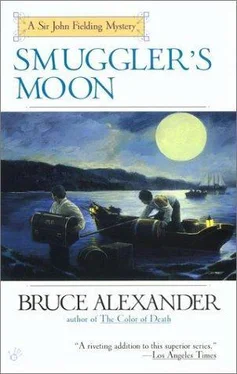Bruce Alexander - Smuggler's Moon
Здесь есть возможность читать онлайн «Bruce Alexander - Smuggler's Moon» весь текст электронной книги совершенно бесплатно (целиком полную версию без сокращений). В некоторых случаях можно слушать аудио, скачать через торрент в формате fb2 и присутствует краткое содержание. Жанр: Исторический детектив, на английском языке. Описание произведения, (предисловие) а так же отзывы посетителей доступны на портале библиотеки ЛибКат.
- Название:Smuggler's Moon
- Автор:
- Жанр:
- Год:неизвестен
- ISBN:нет данных
- Рейтинг книги:4 / 5. Голосов: 1
-
Избранное:Добавить в избранное
- Отзывы:
-
Ваша оценка:
- 80
- 1
- 2
- 3
- 4
- 5
Smuggler's Moon: краткое содержание, описание и аннотация
Предлагаем к чтению аннотацию, описание, краткое содержание или предисловие (зависит от того, что написал сам автор книги «Smuggler's Moon»). Если вы не нашли необходимую информацию о книге — напишите в комментариях, мы постараемся отыскать её.
Smuggler's Moon — читать онлайн бесплатно полную книгу (весь текст) целиком
Ниже представлен текст книги, разбитый по страницам. Система сохранения места последней прочитанной страницы, позволяет с удобством читать онлайн бесплатно книгу «Smuggler's Moon», без необходимости каждый раз заново искать на чём Вы остановились. Поставьте закладку, и сможете в любой момент перейти на страницу, на которой закончили чтение.
Интервал:
Закладка:
Again she sighed. Actually, she sighed quite a number of times during the telling of Molly Sarton’s tale.
“Indeed,” said I, ”you certainly got a lot out of her in a short time.”
“It’s true, isn’t it? But you know, I believe she’s lonely. She seems to have no one to talk to. I came along, eager to hear, and she simply came out with it.”
Then did Clarissa stop of a sudden and look about her, as if noticing her surroundings for the first time.
”Dear God,” said she, ”it is the sea, isn’t it?”
Indeed it was, for we stood on Beach Street quite near the pier, where a few fishing boats of differing shapes and sizes jittered in the glittering water.
“You may call it the sea or the Channel, whichever suits you best.”
“I’d no idea we were so close.”
“Didn’t you smell it? Nothing quite like the smell of the sea. But come, let’s walk out on the pier and look at the boats, shall we?”
And that we did, finding much to laugh at as we went upon our way: at the gulls, for instance, which seemed the most pompous of birds as they strutted about boat and pier; and at rest, they seemed to strike heroic poses as they stared out over the sea in the direction of France.
In general, I led Clarissa along the route I had traveled the day before. The difference, of course, was that together we traveled at a more leisurely pace, thus finding more to see, more to notice, along the way. It was in that way far more enjoyable than yesterday’s brisk race to the castle and back.
At the fish market, Clarissa exclaimed over the variety of seafood which was on display. She pointed to the mussels, the skates, and the ugly eels and crabs.
“Do people really eat such?” she asked.
“Oh, they do indeed,” I assured her, ”and live longer for it-or so I hear.”
And then did we travel on along the sand, examining closely what the sea had left at the waterline. And on to Deal Castle, where the great cannon pointed out toward France. We walked carefully round the moat, daring only to peek down at its murky depths, which seemed more frightening than the sea itself.
On our return I guided us down High Street, where Clarissa shopped in every window either side of the street. She had a talent for it and high standards, as well: though her interest was easily captured, in the end nothing she saw-neither frock, nor locket, nor shawl, nor armoire-satisfied her completely. Thus was she saved the embarrassment of attempting to pay for any of these items with an empty purse.
The tearoom was the happiest surprise of all in our tour of the town. We had passed a coffeehouse on the way, and I looked longingly inside, for as was well known even then, I much preferred coffee to tea. Yet coffeehouses, in Deal as well as London, were of the male province; except for servers, I had never seen a woman inside such a place, nor have I since. Yet as we sat down in our chairs at a table quite near the window of the tearoom, I looked round me and saw that there were women aplenty scattered through the place; some were in the company of men; at other tables there were ladies only; and one brave soul, a woman of apparently limited means, had a table all to herself. The server, a woman of about thirty-five, presented herself and asked our order.
“We should like a pot of your best tea,” said I.
“Oh, well, all our tea is the best, sir. What sort would you like? We’ve Chinese green tea, Indian tea, even Persian.”
Not wishing to seem an utter numskull in matters of tea, I sat for a moment and pondered the matter.
“I understand,” said I, ”that Darjeeling is quite good. It is an Indian tea, is it not?”
“It is indeed, sir, and among the best. I might say that it is the best of the best.”
“Then a pot of that, please, and as for something to accompany it …”
“We have all manner of cakes and dainties, sir.”
“Might I perhaps speak with Mrs. Keen on the matter?”
She assented with a curtsey and disappeared through the curtained entrance to the rear of the shop. It was not much more than a minute later when a woman somewhat older than Mrs. Sarton (but otherwise quite like her) appeared from the rear and came straight to our table. Clarissa and I rose, curtsied and bowed, and introduced ourselves to the woman who offered herself as Mrs. Keen.
“You asked for me?”
“We bring you greetings from Mrs. Sarton,” said I. ”She would not have us pass through Deal without visiting your tearoom.”
“Ah, she wouldn’t, eh? Sounds like her, so it does. How long have you known her?”
“We’ve just met,” said Clarissa, ”and she seems quite the most wonderful person.”
“She is, bless you, and also quite the most wonderful cook in Kent. Indeed I should know, for I was her pastry maker for three years-that is, before both of us was turned out to make room for the new crowd. We’re both better off for it, but poor Molly had to put up with a lot from this town before she and her magistrate were married. Ah, the snubs and the gossip-it was disgraceful.”
Most of this last was whispered, yet there was conversation aplenty in the tearoom; none seemed to be listening.
“But sit down, both of you. I know why Molly sent you here. It was to have a sample of my best. And as it so happens, I just pulled a pan of my best out of the oven. It’ll be here with your tea.”
And it was. Her ”best,” as she called it, was a whole plate of sugar cakes of such a taste and quality as I had never experienced before-nor, for that matter, since. Clarissa and I ate them all, right down to the last crumb. It was, for us both, a most joyous experience of gluttony. (The tea was also good.)
We wandered the length of High Street, but when we came to Alfred Square, with its notorious inns, its drunks staggering about in the daylight hours, I thought it best that we circle round it and avoid it altogether. Thus we returned to Beach Street and to the sea. As we did so, I spied a stretch of sand beach ahead of us which was, in its way, quite mysterious. I had no trouble persuading Clarissa to visit the place with me.
What had attracted my eye at some distance was the unexpected sight of a mast-no, two of them-rising up from the water, bare of sails. As we came closer, I saw that there was even a bit more of the ship to be seen there: the forward gunwales were also barely visible, giving the impression that it was rising from the sea of its own power, like some great monster of the deep. Yet there were no depths where the masts rose up-only shallows. We stood together looking out at it. I, for one, felt something more than curiosity and something less than awe, and yet a bit of both.
“How do you suppose it got there?” Clarissa asked.
“It ran aground,” said I. ”Perhaps it was bad navigation that brought it to such an end. Or it may be that it was driven there by a storm.”
“It looks old. I wonder how long it’s been here.”
“I couldn’t say, though I’m sure there are those in town who could tell us with fair exactitude.” I studied its position in relation to the waterlines in the sand. ”At lowest tide it might be possible to walk out to it or wade there from the shore.”
“Possible for you perhaps,” said Clarissa, ”though not for me with these great skirts I must wear. Sometimes, Jeremy, I simply loathe being a girl.” She gave that a moment’s thought, and then added: ”And sometimes I quite enjoy it.”
Returning to Number 18 Middle Street, we were both surprised to learn that it was well into the afternoon-near three o’clock, as I recall. The meeting (to which I had not been invited) had concluded less than an hour before, and Sir John had asked if there might be a place, perhaps upstairs, where he might take a nap. He was accompanied to the small guest bedroom by Mr. Sarton. Sir John assured him that he was not ill, simply tired. This was heard from Mr. Sarton himself as he prepared to leave on an errand.
Читать дальшеИнтервал:
Закладка:
Похожие книги на «Smuggler's Moon»
Представляем Вашему вниманию похожие книги на «Smuggler's Moon» списком для выбора. Мы отобрали схожую по названию и смыслу литературу в надежде предоставить читателям больше вариантов отыскать новые, интересные, ещё непрочитанные произведения.
Обсуждение, отзывы о книге «Smuggler's Moon» и просто собственные мнения читателей. Оставьте ваши комментарии, напишите, что Вы думаете о произведении, его смысле или главных героях. Укажите что конкретно понравилось, а что нет, и почему Вы так считаете.












